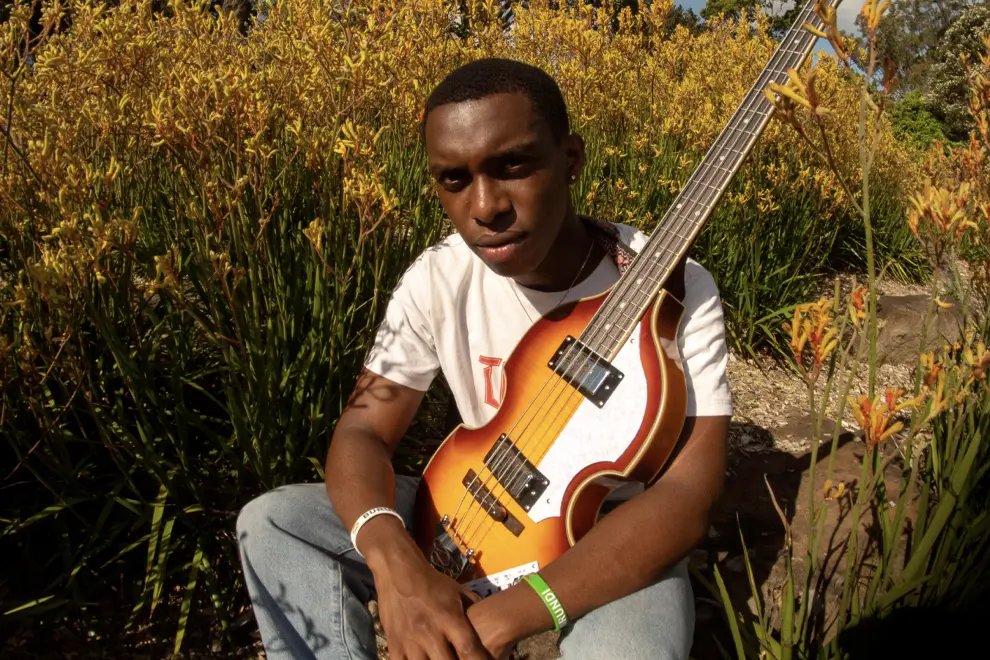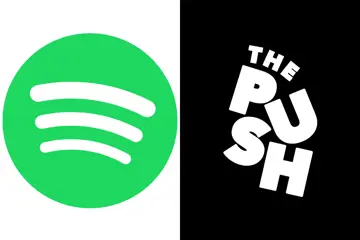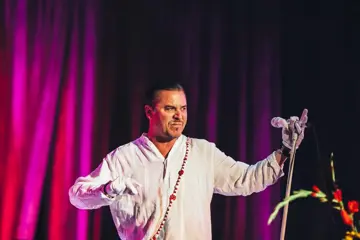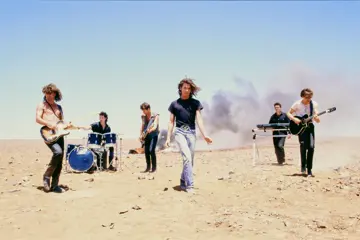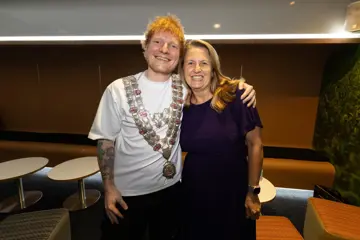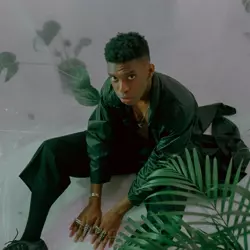 Stevan
StevanThe Eora/Sydney indie-popster Stevan (aka Ian Muhayimana) is reminiscing about falling in love.
"I remember my first girlfriend in high school – and I remember that's when I started writing music, 'cause I'd always wanted to produce, but I never had anything to say," he reflects.
"I just didn't have any inspiration – and I didn't understand how songwriting worked. I'm like, 'Where does the inspiration come from? It seems weird.' But then I had all these things to say about this girl… My love for music came into my life around the same time that I developed romantic love – and I think it always mirrors itself."
That symmetry is apparent on his new EP, Arrested Development – the songs chronicling a more "serious" romance as it sours and Muhayimana's departure from Warner Music Australia (WMA). But, rebooting his career, the vocalist, songwriter, multi-instrumentalist and producer is grateful to be recording the music he wants to.
A relaxed Muhayimana is Zooming from his Eora/Sydney home, suggesting that he "might not be here in October" as the US calls. He's surprisingly open in discussing the major label experience and pressures of being an emerging artist and then going independent.
In fact, Muhayimana has created his own space in the industry while coming of age – and exploring his identity.
Don't miss a beat with our FREE daily newsletter
Growing up in coastal Wollongong, New South Wales, Muhayimana was raised on his dad's collection of Al Green, Bill Withers, and Bob Marley cassettes – Black heritage music.
Soon he was introduced to US hip hop by a cousin and, as an African-Australian, related to its social messaging. Muhayimana's Gen Z pals extolled their rock discoveries – Tame Impala, Canadian fave Mac DeMarco and even '70s band America ("Which I ended up growing up and being like, 'Yo!'"). This cross-cultural exchange shaped him as an artist.
"I think, sonically and musically, I'm a product of my time," Muhayimana says. "When I grew up, everybody was listening to everything... We have such a decentralised community, my demographic.
“We didn't grow up with as much bounds on things... We were just sharing – that was the best thing about being young. We would share everything."
“It's just like, If it was good, that's what I kind of love,” he emphasises. “It stopped being about genre; it stopped being about cultural alignment."
Admiring Pharrell Williams' beatmaking, Muhayimana played drums prior to teaching himself guitar by watching John Mayer videos on YouTube. He cut early tunes in his bedroom, uploading them to SoundCloud – 2016's Ugly gaining traction.
The prodigy attracted a fandom utilising Instagram Live. "I used to love making content before content was a thing." Plus he forged vital connections – one, Omar Apollo, later booking him as a tour support for his Laneway sideshows.
"I just was very religious with dropping demos on SoundCloud and I would engage with everybody. Funnily enough, I made friends and then they were way bigger than me, as far as artistry and career-wise."
Heralded by The Music, Muhayimana's "big break-out" came in 2019 with the jangly Timee – and he toured with Winston Surfshirt.
The following year, he issued a buzz mixtape, Just Kids, inspired by Frank Ocean's avant-soul nostalgia,ULTRA, on Astral People Recordings – the teen's sound a wistful blend of R&B, soul, hip-hop, ska, reggae, surf-pop, indie and psychedelia, accompanied by whimsical videos.
At the end of 2020 a second arty project, Ontogeny, arrived. This time, Muhayimana collaborated with Melbourne/6LACK cohort Lucy Blomkamp, veering into trap.
Acknowledging that he enjoyed "a lot of momentum right at the beginning," Muhayimana nonetheless struggled to navigate industry changes during the COVID-19 pandemic.
"I was stuck in the transitional period between starting, having and then growing a career." In mid-2022, Warner Music Australia announced that they'd signed the 'next big thing' in partnership with The Rubens' imprint Purple Phase (Muhayimana had supported the alt-rockers on regional dates).
"I was like, 'I need something dramatic, 'cause I've just been locked away for two years' and it kind of freaked me out into signing." He hit Splendour In The Grass.
Yet Muhayimana had battles – clashing with the label over whether to feature a pre-MILLION DOLLAR BABY Tommy Richman on his comeback CRASH. "He had no big wins, no monthly listeners, no social media presence. But I was like, 'He just has a voice; he has a thing about him.'"
He aired the indie-leaning EP Loners Club. Still, there was little promotion. "The people who are making the most noise are getting the most priority [and] are getting the biggest push," Muhayimana says.
"You know, when you're a young artist, you think the biggest thing you can do is sign on a major record label and get all that attention – and then you realise it's got its own inner workings. It's its own beast."
British executive Darcus Beese has spoken about how data impacted A&R and curation – promo increasingly laissez-faire as acts rely on platforms like TikTok for virality. Muhayimana, too, questions the contentification of music.
"I think now, with the TikTok thing, I understand that it's working for some people, but it's diluting the music and it's diluting the experience, 'cause a lot of people wanna be exposed to artists – like, 'Wow, I just discovered something new.'
“[But] I don't think they necessarily wanna see an artist they love begging for attention or for hype... TikTok has just removed such a rebellious and free and kind of rogue attitude which is part of what music is about. Music has a defiant nature to it and it's meant to be challenging us."
He's no longer a fan of TikTok. "Me personally, I don't think I've met a single artist who's like, 'I love this – I love making content.' I don't know if I've met one.”
Today Muhayimana is again indie, having aligned himself with New Relic Records – established by photographer/cinematographer Alec "SHWHY" Schweitzer in Los Angeles.
Another old online pal, New York rapper Skizzy Mars, had a crucial role. "We developed a really good friendship and we'd just message each other all the time; send each other demos. Little did I know, Alec and my mate Skizzy, they're childhood friends."
Schweitzer heard Muhayimana had left Warner and contacted him. "He came through and he's just like, 'Dude, I'd really love to work, I love the music. Is there any way we can come together and bring a vision together?'"
Muhayimana is now presenting his boldest project yet in Arrested Development. But, ever-DIY, he's been rolling out the EP by releasing all of its eight tracks as singles, commencing with Nostalgia in June.
The strategy is "artist-first," but Muhayimana is playing the long-game, cognisant that he doesn't have major label access to streaming platforms or radio executives. Schweitzer's visual background has been an asset.
"It's trying to capture their attention and trying to also showcase some creativity alongside that." Muhayimana is ushering in a new age of authenticity.
Ironically, as his partnership with Warner dissolved, the star endured his first adult break-up – splitting from a girlfriend in New York. However, the love songs on Arrested Development are allegorical – Muhayimana penning War in response to the CRASH debacle.
"When I left Warner and then my relationship fell apart, it felt like, 'Oh, my God – we're just doing this again,'" he laughs. "It felt like another lockdown. It just felt like I kept having resets. I'd build all this momentum, I'm right at the verge of breaking, and then something really tragic happens.
"I really worked through a lot of stuff that I think was necessary for me to work through in order to get the project out, but also to feel very comfortable and happy with the future of where I'm gonna go – because a lot of artists, it's very easy to get lost or it's very easy to be like, 'It didn't work, now it's all over' and to not have a plan to move forward.
"I'm very fortunate that it seems like at every corner when something is looking bleak, I kind of have an 'Aha!' moment or an epiphany or I'm like, 'This is the next step, this is where we're going.'"
On Arrested Development, Muhayimana "unpacks" conflicting emotions. "This is why creativity is so good,” he explains. “Subconsciously problems start to merge – and it's like life. You're not pulling stress from just one thing or when something's bothering you, usually it's not one thing."
He intuited that his tendency to idealise situations was "mirrored" professionally and in relationships – his lyrics sentimental – and this prompted Nostalgia. "I'm starting from the point of when I wanted to start healing or when I wanted to start moving past a lot of stuff that I thought was bogging me down.
"It was a beginning process of me feeling better – and I think, in order to feel better, I had to realise that, all things considered, a career and relationship, there was a lot of great times and a lot of good things.
“There is a reason why I made certain choices,” he adds. “Everything didn't come from a place of pain and distress and stress. That just wasn't the reality of the progression that I had."
The last single, The Cure is about that emotional transformation. "It was me wanting to make it better, wanting to cure myself, cure my relationship with my partner, my ex, and also cure my relationship I think with my attitude towards music – 'cause there was a time where I didn't want to do it anymore."
Indeed, music began to feel like a job, rather than a vocation. "I had to heal properly and I had to realise that I do this because it brings me so much joy – and that aspect needs to be the most important part of it."
Muhayimana has perspective. "Now I'm nostalgic about everything, but without all the baggage," he says drolly.
Muhayimana is feeling liberated in another sense. Black artists have historically challenged racialised descriptors, including 'R&B'. But Muhayimana has consistently advanced a post-genre style at a juncture when more creatives of colour are breaking boundaries, cultural "gatekeeping" in decline.
"The audience is catching up before the labels are and the labels are responding to the audience,” he says. “We're seeing that with guys like Mk.gee and Dijon, who were huge parts of Justin Bieber's new album [SWAG] – and he's a major pop artist.
“I think that, sonically, people are seeing the weird stuff win. So the labels aren't necessarily getting hip to the times, the audiences are saying, 'We don't care what the genre is.'"
Muhayimana notes the significance of Beyoncé's "revolutionary" country album, COWBOY CARTER, winning the Grammy for Album Of The Year. "It's so easy to get caught up in the negatives," he asserts.
"Everyone wants to always talk about 'Blah, blah, blah.' And I'm not a negative person. So I always see the progressions we're making and how exciting the future could be if the right people capitalise and champion the right things."
Not that Muhayimana minds being called 'R&B'. "I don't necessarily think people have to publicise me the right way, anyways! I kind of wanna be miscategorised because, when people listen, it's gonna be that much more interesting when they hear a song that sounds like Tame Impala and then another one that sounds like it's by The Internet or by Steve Lacey or by Tyler, The Creator."
Far from predictable, Muhayimana is teasing a remix companion to Arrested Development that will represent his first foray into dance/electronic music since linking with Eora/Sydney duo Cosmo's Midnight on 2020's Yesteryear.
Early in his career he met Aussie super-DJ Tommy Trash – whose remix of deadmau5's The Veldt was nominated for a Grammy in 2012 – and they've "reimagined" Arrested Development. Muhayimana is tapping into the Zeitgeist. "Music is going in a place where people wanna dance."
Confident, Muhayimana launched Arrested Development with a live show in Eora/Sydney and other East Coast dates to come. "I've noticed that I've become very good at being more of a showman."
At any rate, Muhayimana is moving beyond Arrested Development. "The whole thing for me was like, 'I need to mature and grow from these experiences' – and the only way that you can is by letting go of things and moving on to whatever the next chapter is.
“And I think that the whole Arrested Development [process] for me was working through the things that I couldn't look back on and let go. But now I look back on everything and I'm like, 'There was some good things, there was some bad things.'
"Emotionally it was like a bit of a rollercoaster time period of my life, but all of it was necessary – and, not to be 'kumbaya' about everything, but all of it served a greater and higher purpose in my journey in music and in life,” he adds. “I don't regret any relationship that I had professionally or romantically at that time."
Stevan’s Arrested Development is out now.
This piece of content has been assisted by the Australian Government through Music Australia and Creative Australia, its arts funding and advisory body


